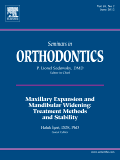
Seminars in Orthodontics
Scope & Guideline
Exploring Cutting-edge Orthodontic Methodologies
Introduction
Aims and Scopes
- Clinical Education and Training:
The journal emphasizes the importance of clinical education and training for orthodontic residents and practitioners, focusing on curriculum development, innovative teaching methods, and assessment strategies. - Digital Technology Integration:
There is a strong focus on the applications of digital technologies in orthodontics, including 3D printing, artificial intelligence, and digital workflows, which are shaping modern orthodontic practices. - Interdisciplinary Approaches:
The journal explores the intersection of orthodontics with other dental and medical fields, highlighting collaborative approaches in treating complex cases, particularly those involving temporomandibular disorders and periodontal health. - Research Methodology and Evidence-Based Practice:
A commitment to improving research methodologies within orthodontics is evident, with a focus on statistical analysis, systematic reviews, and the importance of evidence-based practice to inform clinical decisions. - Emerging Trends and Innovations:
The journal serves as a forum for discussing emerging trends in orthodontics, such as the use of clear aligners, teleorthodontics, and the evolving landscape of orthodontic practice management.
Trending and Emerging
- Artificial Intelligence and Machine Learning:
There is a growing focus on the application of artificial intelligence and machine learning in orthodontics, exploring its potential to enhance diagnostics, treatment planning, and patient management. - Digital Workflow and 3D Printing:
An increasing number of publications are dedicated to the integration of digital workflows and 3D printing technologies, emphasizing their role in improving efficiency and customization in orthodontic treatment. - Interdisciplinary Treatment Approaches:
Emerging themes include the exploration of interdisciplinary treatment approaches, particularly in managing temporomandibular disorders and their relationship with orthodontic care. - Psychosocial Aspects of Orthodontic Treatment:
Recent studies are increasingly addressing the psychosocial aspects of orthodontic treatment, recognizing the importance of patient experiences and mental health in treatment outcomes. - Education and Curriculum Development:
There is a notable trend towards enhancing orthodontic education, with a focus on modernizing curricula to better prepare residents for contemporary challenges in the field.
Declining or Waning
- Traditional Orthodontic Techniques:
There is a noticeable decline in publications focused on traditional orthodontic techniques, such as fixed appliances, as newer methodologies and technologies gain traction. - General Orthodontic Procedures:
Research centered on general orthodontic procedures, without specific innovative or technological angles, has become less frequent, indicating a shift towards more specialized or advanced topics. - Historical Perspectives on Orthodontics:
Papers discussing historical perspectives or foundational concepts in orthodontics are appearing less often, suggesting a move towards contemporary issues and innovations.
Similar Journals
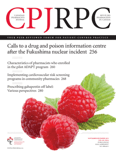
Canadian Pharmacists Journal
Advancing pharmaceutical knowledge for a healthier tomorrow.The Canadian Pharmacists Journal, published by SAGE Publications Inc, serves as a pivotal platform for advancing research and dialogue within the fields of Pharmaceutical Science and Pharmacy. With an ISSN of 1715-1635 and an E-ISSN of 1913-701X, this esteemed journal has demonstrated its commitment to excellence, securing a notable Q2 ranking in both categories as of 2023. Researchers and practitioners can access a wealth of knowledge from its publications, reflecting innovative practices and foundational studies in the realm of pharmacy. The journal's scope is expansive, targeting key issues that drive the evolution of pharmaceutical practices in Canada and beyond, making it an indispensable resource for pharmacists, healthcare professionals, and students dedicated to the advancement of patient care and medication safety. Its dedicated insights and analyses are vital for fostering a deeper understanding of the dynamic landscape of pharmacy, ensuring that it remains a crucial reference point for all stakeholders in the field.
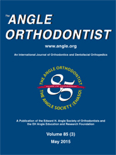
ANGLE ORTHODONTIST
Pioneering insights for the future of orthodontics.Welcome to the ANGLE ORTHODONTIST, a premier open-access journal published by the E H Angle Education Research Foundation, Inc., dedicated to advancing the field of orthodontics. Established in 1945 and now available in digital format since 2004, this journal has become a vital resource for researchers, practitioners, and students alike, providing a platform for innovative research and clinical insights that shape orthodontic practice. With an impressive impact factor and categorized in the Q1 quartiles for both medicine (miscellaneous) and orthodontics, the ANGLE ORTHODONTIST is recognized as one of the leading journals in its field, currently holding the 2nd rank out of 39 in dentistry orthodontics with a remarkable 96th percentile in Scopus rankings. As a beacon of knowledge based in the United States, the journal publishes original articles, reviews, and case reports that ensure the dissemination of high-quality information and the promotion of best practices in orthodontics. Join our community of scholars and contribute to the ongoing dialogue that drives the evolution of orthodontic practices worldwide.

Gefasschirurgie
Connecting professionals with cutting-edge vascular research.Gefasschirurgie, a leading journal published by Springer Heidelberg, serves as a pivotal resource in the fields of surgery and cardiology with a robust focus on vascular surgery. With its ISSN 0948-7034 and E-ISSN 1434-3932, the journal provides a platform for the dissemination of innovative research findings, clinical practices, and advancements in minimally invasive procedures, aimed at improving patient outcomes. Established in 1996 and expected to continue until 2024, *Gefasschirurgie* has built a considerable reputation in both the surgical and cardiovascular medicine communities. Although currently categorized in Q4 for Cardiology and Cardiovascular Medicine and Q3 for Surgery, the journal's commitment to publishing high-quality, peer-reviewed research helps advance the understanding and treatment of vascular conditions. It is essential for professionals, researchers, and students aiming to stay abreast of new techniques, clinical trials, and surgical methods in the evolving landscape of vascular health.

Clinical and Investigative Orthodontics
Illuminating the Path to Orthodontic AdvancementClinical and Investigative Orthodontics is a significant peer-reviewed journal published by Taylor & Francis Ltd in the United Kingdom, focusing on the dynamic field of orthodontics. With an ISSN of 2770-5781 and E-ISSN of 2770-579X, this open-access journal facilitates a wide dissemination of research findings and innovative practices in clinical and investigational orthodontics. Since its inception in 2022, the journal has positioned itself at the forefront of orthodontic research, attaining a Category Quartile ranking of Q3 in Orthodontics for 2023, alongside a Scopus rank placing it within the 37th percentile among its peers. This underscores its relevance and commitment to advancing knowledge in the orthodontic community. Researchers, dental professionals, and students are invited to explore groundbreaking studies, clinical insights, and advancements shaping the future of orthodontics through this essential publication.
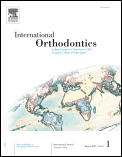
International Orthodontics
Inspiring Progress in Dental OrthopedicsInternational Orthodontics, published by ELSEVIER MASSON SAS EDITEUR, serves as a premier platform dedicated to the field of orthodontics, offering a crucial resource for researchers, professionals, and students alike. With an ISSN of 1761-7227 and an E-ISSN of 1879-680X, the journal boasts an impressive Q2 ranking within the orthodontics category, affirming its influential role in the academic landscape as it converges from 2004 to 2024. Located in France, at 62, RUE CAMILLE DESMOULINS, ISSY LES MOULINEAUX CEDEX 92442, this journal fosters a commitment to advancing orthodontic knowledge through rigorous peer-reviewed research. While there are no Open Access options currently available, the journal remains accessible to a broad audience through institutional subscriptions. The impact factor and specific H-index details enhance its credibility further, as it consistently ranks among the top journals in Dentistry - Orthodontics, standing at Rank #12 out of 39 in Scopus, positioning it within the top 30% of its field. Published quarterly, International Orthodontics aims to disseminate significant findings that propel the discipline forward, exploring innovative techniques, technological advancements, and comprehensive treatment methodologies essential for successful orthodontic practice.

International Journal of Orthodontic Rehabilitation
Advancing Orthodontic Knowledge for a Brighter SmileThe International Journal of Orthodontic Rehabilitation, with ISSN 2349-5243 and E-ISSN 2542-5579, is a prominent publication dedicated to advancing knowledge in the field of orthodontics and dental rehabilitation. Published by MM INDIA MEDICAL SERVICES PRIVATE LTD, this journal aims to provide a platform for researchers, clinicians, and students to disseminate innovative practices, contemporary research findings, and case studies that shape the future of orthodontic treatment and patient care. As an integral resource for professionals in the dental community, the journal balances rigorous peer-reviewed research with practical applications, beneficial for enhancing clinical practice. While currently operating under a standard access framework, the journal's dedication to fostering scientific inquiry establishes it as a vital outlet for those seeking to deepen their understanding of orthodontic techniques and patient outcomes. By bridging theory and practice, the International Journal of Orthodontic Rehabilitation plays a crucial role in fostering collaboration and knowledge exchange within the global orthodontic community.

INTERNATIONAL JOURNAL OF PROSTHODONTICS
Shaping the Future of Prosthodontics Through ScholarshipInternational Journal of Prosthodontics, published by Quintessence Publishing Co Inc, is a premier peer-reviewed journal dedicated to advancing the field of prosthodontics—a vital branch of dentistry focused on the design and fitting of artificial replacements for teeth and other parts of the mouth. Established in 1988 and converging through to 2024, this esteemed journal is recognized for its impactful contributions, evidenced by its strong ranking in the Q1 category in Oral Surgery and Q2 in Medicine (miscellaneous) for 2023. With an impressive Scopus ranking at #26 out of 74 in Dentistry and Oral Surgery, it proudly stands in the 65th percentile among related publications. Although it operates under a traditional access model, it remains a crucial resource for researchers, dental professionals, and students seeking cutting-edge insights, methodologies, and innovations in prosthodontics. By fostering a platform for high-quality research, the International Journal of Prosthodontics aims to enhance clinical practices and improve patient outcomes across the globe.

International Journal of Esthetic Dentistry
Advancing the Art and Science of Dental AestheticsInternational Journal of Esthetic Dentistry, published by QUINTESSENCE PUBLISHING CO INC, serves as a vital platform for advancing the field of esthetic dentistry. Dedicated to the dissemination of high-quality research and innovative practices, this journal offers a comprehensive exploration of advancements in dental aesthetics and related disciplines. With an ISSN of 2198-591X and a notable presence in the academic community, it has achieved a Scopus rank of #84 in the General Dentistry category, reflecting its relevance and contribution to the field, especially with an emerging impact factor that positions it in the Q3 quartile in Medicine (miscellaneous) as of 2023. Although access is not open, the journal’s curated content from the years 2014 to 2024 includes peer-reviewed articles, case studies, and reviews that are invaluable for researchers, practitioners, and students alike, fostering an environment of continued learning and professional development.
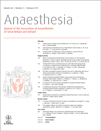
ANAESTHESIA
Shaping the Future of Pain Management: A Legacy of ExcellenceANAESTHESIA is a premier peer-reviewed journal published by WILEY, dedicated to advancing the field of anesthesiology and pain medicine. With a rich history dating back to 1947, this journal has established itself as a vital resource for academics and practitioners, reflected in its esteemed Q1 category ranking in Anesthesiology and Pain Medicine for 2023. Recognized for its high-impact research, ANAESTHESIA holds the distinction of being ranked #1 out of 136 in Scopus within its specialty, placing it in the 99th percentile of medical journals. Though it does not offer Open Access, it provides an essential platform for discussing innovative techniques, clinical practices, and important advancements in anesthetic science, ultimately enhancing patient care and safety. With its commitment to excellence, ANAESTHESIA is a must-read for researchers, clinicians, and students seeking to remain at the forefront of anesthesia and pain management developments.
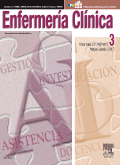
Enfermeria Clinica
Connecting theory and practice for superior nursing outcomes.Enfermeria Clinica is a distinguished journal published by Elsevier España SLU, dedicated to advancing the field of nursing through robust scholarly research and clinical practice. With an ISSN of 1130-8621 and E-ISSN of 1579-2013, this esteemed journal serves as a vital resource for nurses, healthcare professionals, and researchers. Operating from Spain, it has established a reputation for excellence, notably achieving Q3 ranking in the categories of Fundamentals and Skills, Nursing (miscellaneous), and Research and Theory in 2023, indicating a solid influence within the academic community. The journal is devoted to disseminating innovative research that informs nursing practices and improves patient care. Although it operates on a subscription basis, the insights and findings published in Enfermeria Clinica are invaluable for those looking to enhance their knowledge in nursing evidenced-based practice. The journal’s commitment to bridging research with real-world application makes it an essential tool for both emerging and established professionals in the nursing field.